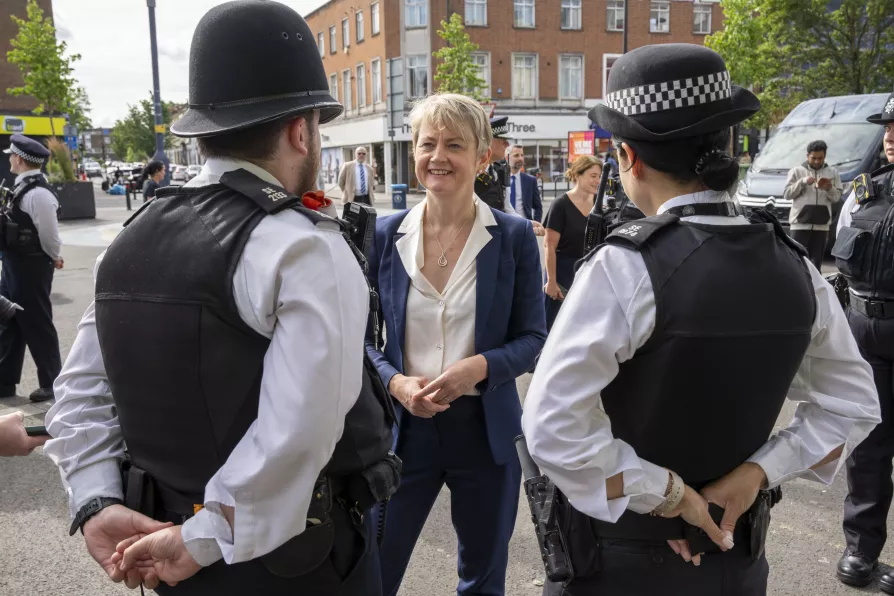
 Home Secretary Yvette Cooper during a walk through Lewisham town centre, in south London, as part of a visit to speak about neighbourhood policing and meet with policing teams, July 8, 2024
Home Secretary Yvette Cooper during a walk through Lewisham town centre, in south London, as part of a visit to speak about neighbourhood policing and meet with policing teams, July 8, 2024
YVETTE COOPER’S crackdown on “extremism” is full of danger for the left, and could confirm that Labour will plough the same authoritarian furrow as the last government.
This should not be a surprise: Labour’s response back in March to Michael Gove’s new definition of extremism (ideologies which seek to “undermine, overturn or replace the UK’s system of liberal parliamentary democracy”), and his assumption of a ministerial right to slap that label on organisations at a whim, was to say the old government was not going far enough.
This is a test of class politics. Race-hate has sparked riots across Britain in the last fortnight, the literal flames fanned by lies promoted on social media. Violence against women is at epidemic levels.
This engenders natural sympathy for Cooper’s stated desire to suppress hateful ideologies, including misogyny. The clamour for bans on “fake news” is heard from much of the left, inflamed by the reckless and provocative conduct of the owner of social media platform X, Elon Musk.
But it is a mistake. It is not the British state’s response but that of communities defending themselves against fascism which has played the biggest role in facing down the far right this month, as even Met Commissioner Sir Mark Rowley conceded.
Sir Keir Starmer’s demand for harsh penalties for “disorder” ignores the politics of the riots. It’s a sweep net that catches those confronting fascism as well as those promoting it: like Plymouth resident Amer Walid, jailed for 20 months for throwing cans at a far-right mob in response to their hurling alcohol over him.
This young man with no previous convictions will have a permanent criminal record for failing — in the judge’s words — to “rise above [the] simply obnoxious racism” of a violent mob who were actually attacking him.
Cooper cites both far-right and Islamist hate. But political Islam has no profile in Britain at all. She, like Lord Walney, seeks to lump violent fascist riots together with the peaceful Palestine solidarity movement, whose mass demos have been slandered as “hate marches” by the Tories, right-wing media and fascist agitators such as Tommy Robinson.
Where jihadist violence has reached Britain, it has had more to do with our state’s hyper-violent foreign policy than online grooming. The deadliest terror attack of the last decade, that on the Manchester Arena by Salman Abedi in 2017, was carried out by a man our government had helped travel to Libya to fight in a British-backed Islamist revolt against its government, and whose return to Britain was facilitated by MI5.
A state campaign against extremism “across the political spectrum” will reinforce the clampdowns on protest rights and free speech associated with the Conservatives.
That Labour’s current leadership will deploy it to silence left criticism seems predictable given their record: this is the party that banned its branches from discussing the suspension of its former leader Jeremy Corbyn on the ludicrous grounds that this would make Jewish members feel unsafe.
Bans on “fake news” could only be welcomed if we had total confidence in the objectivity and fairness of those sifting the truth from the lies. X, Facebook and indeed the British state are not objective. There is no way such a ban would not simply become a form of political censorship exercised by the ruling class.
The left, and the anti-racist movement’s, response to this will determine much.
Do we place our trust in mobilisation from below, in uniting the struggles for anti-racism, peace, the environment and labour, in a radical challenge to racism, the right and the British state?
Or do we acquiesce in further empowering that state, despite its demonstrably racist immigration and policing policies, despite its deep hostility to working-class organisation and public protest, in the misguided hope it will prove a bulwark against the hatred it has helped to fuel?














